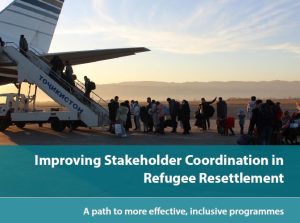Improving global refugee settlement programs globally
The world’s refugee settlement programs are struggling to keep up with spiralling displacement crises, a new report says.
The report, titled: ‘Improving Stakeholder Coordination in Refugee Resettlement: A path to more effective, inclusive programmes’, produced by the European arm of the Washington-based think tank The Migration Policy Institute, says refugee resettlement programs globally are facing tough times.
It says resettlement numbers were dramatically cut during the COVID-19 pandemic, with just 34,400 refugee admissions in 2020 as compared to 107,800 the year before.
And, large-scale displacement crises, including in Ukraine and Afghanistan, have diverted resources and attention away from resettlement programmes towards emergency responses.
 The report says “longstanding difficulties establishing coordination and communication among the governments, international organisations, civil society and community groups involved in resettling refugees” is hampering much-needed growth and improvement of existing resettlement programs.
The report says “longstanding difficulties establishing coordination and communication among the governments, international organisations, civil society and community groups involved in resettling refugees” is hampering much-needed growth and improvement of existing resettlement programs.
“With a record 35.3 million refugees worldwide as of the start of this year, and 110 million displaced in total, resettlement programmes face significant challenges keeping up with the escalating needs for protection,” the report says.
“Despite acknowledgment by key actors such as the UN High Commissioner for Refugees (UNHCR), the European Union and select resettlement countries (including Australia), progress in increasing annual resettlement numbers and the list of countries willing to resettle refugees has largely stalled or even eroded,” it says.
The report highlights the need and role for effective coordination among stakeholders at international, national, regional and local levels to overcome obstacles and promote the enhancement and expansion of resettlement efforts.
It stresses the importance of seamless coordination and communication for improving the efficiency and sustainability of resettlement programmes, enhancing refugee support and integration outcomes and unlocking opportunities for programme expansion.
“From setting admission numbers and selecting refugees to facilitating pre-departure procedures, placement within host countries and integration support, stakeholders must work together cohesively—a concept that is widely embraced but lacking in ideas on how to execute,” it says.
The report draws lessons from existing resettlement program, including Australia’s, as well as from emergency protection responses to displacement from Afghanistan and Ukraine.
The report identifies several key coordination challenges, including the difficulty determining which stakeholders should be involved in resettlement planning and implementation, how inclusive these systems should be and what role subnational actors should have in decision-making processes.
The lack of attention to local capacities and the absence of effective communication between local and national authorities can result in unrealistic admissions quotas, inadequate service delivery and difficulties integrating refugees into communities.
“Divergent goals among stakeholders, political shifts impacting resettlement priorities and capacity challenges further complicate coordination efforts,” it says.
The report recommends strategies including investing in awareness raising, training and guidance for local actors to ensure their active and informed participation in resettlement; and securing sufficient funding for multilevel coordination that involves subnational actors in resettlement efforts as well as reinforcing their pre-arrival preparedness and post-arrival integration service delivery.
“Without more effective multilevel communication and coordination, resettlement programmes will find it difficult to maintain their current capacity, let alone enhance refugee integration outcomes and make good on promises to expand operations”, the report says.
The report points out Australia’s relatively high per capita intake of refugees.
In 2022, the United States welcomed the largest share of UNHCR-referred refugees resettled that year (37.5 per cent), followed by Canada (18.9 per cent), Germany (8.2 per cent), Sweden (7.7 per cent), France (5.4 per cent), Australia (5.2 per cent), and Norway (4.8 per cent).
Read the full report here: www.migrationpolicy.org/research/coordination-refugee-resettlement












